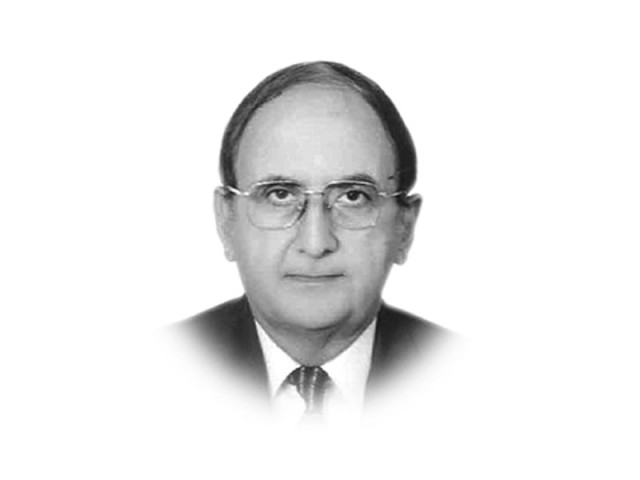Managing the terror threat
Current civil-military fusion with military handling some civilian affairs may not prove to be a stable relationship

The writer is an independent political and defence analyst. He is also the author of several books, monographs and articles on Pakistan and South Asian affairs
The key civilian and military officials, as well as the leaders of political and religious parties, were vocal in criticising the attack and the civilian and military leadership. All of this sounded very familiar. We saw similar activity after the attack on the Army Public School last December. A 20-point agenda was announced and the Constitution was amended to accommodate military courts for two years under the ongoing civilian democratic system.
Five months down the road from the Peshawar incident, we do not know what happened to the 20-point National Action Plan. The army and the Rangers made some quick moves. The civilian provincial and federal governments arrested a few thousand people on the basis of the list of criminal and dubious people available with the police; some books were banned and an action was launched against the use of loudspeakers by mosques. The federal government also announced steps to regulate the madrassa system. With the religious leadership adopting a defiant posture, the federal and provincial governments stepped back. Most things have returned to the pre-December stage. All militant and sectarian leaders are free to engage in their activities.
The Rangers and the army showed their teeth in Karachi by launching a raid against a political party, arresting a number of its activists. Later, videotapes of Saulat Mirza were released targeting that party. All of this happened in the second week of March. It is now the middle of May and we do not know anything regarding the follow-up of all this. Saulat Mirza has now been hanged and his videotape has become history.
Pakistan’s inability to fully control religious extremism and terrorism can be attributed to a set of dilemmas faced by the civilian leadership and the military top brass. The civilian leaders, especially those in power at the federal and provincial levels, lack a sustained policy focus, they have no unity of mind on terrorism and a tendency to view all state policy issues, including religious extremism and terrorism, from their narrow partisan perspectives. They spend more energy in contesting one another.
The biggest tragedy is that the civilian power elite and other political and religious leaders lack the unity of mind as to who is responsible for terrorism. They differ on sectarian killings, either due to possessing a religious denominational mindset or because of political considerations. Why should they lose votes by criticising hardline religious and sectarian groups? Others are bogged down in conspiracy theories and talk about the role of an external hand. It is true that if a country experiences internal strife and disorder, other countries may exploit the situation to their advantage. The best way for the neutralisation of external intervention is to eliminate the groups that seek foreign support, with the funding of their violent activities being especially focused upon.
Another important development in the post-Peshawar incident period was the increased role of the military in civilian governance and internal security matters. The apex committees signify a new civilian-military hybrid that provides an institutional framework for the expanded role of the military in civilian affairs that has pushed the provincial cabinets aside. The provincial apex committees meet periodically at the Corps headquarters, in which the chief ministers and other civilian leaders participate. This has enhanced the role of the corps commanders based in the provincial capitals. This arrangement serves the interests of civilian and military leaders. The military’s top leadership has involvement in policymaking at the federal and provincial levels as it is convinced, and rightly so, that civilian leaders cannot alone cope with terrorism and extremism. The loss of power by the civilian leaders is compensated by the exclusion of the fear of being totally knocked out from top civilian positions. The semblance of civilian rule enables Nawaz Sharif and his colleagues to stay in power and it saves the military from being criticised for displacing an elected civilian system.
However, the chances of strains in the current civilian-military hybrid with a heavy tilt towards the military cannot be ruled out. The military is over-burdened and over-stretched because of the military operation in North Waziristan and other tribal agencies, maintaining internal security in Karachi, policymaking on certain foreign policy and external security issues, giving support to civilian authorities for many civilian tasks, including security tasks on the eve of some by-elections, and its role in apex committees.
The Karachi incident has increased the military’s responsibility because the civilian federal and provincial governments have no definite ideas about controlling terrorism; they lack ideas and capacity. When the military moves quickly to control terrorism, it will be confronted with the harsh reality of linkages between some political parties and criminal and terrorist elements. Therefore, the current civil-military fusion, with the military handling selected civilian affairs, including controlling terrorism, may not prove to be a stable relationship. If the military leadership goes incessantly after religious extremists, terrorists and criminal elements, it may be knocking at the doors of powerful political bosses and religious institutions.
The restoration of the primacy and credibility of the Pakistani state is a multifaceted challenge. In addition to terrorists, a number of powerful political, economic and religious syndicates flout the state or dictate their terms to it.
Published in The Express Tribune, May 18th, 2015.
Like Opinion & Editorial on Facebook, follow @ETOpEd on Twitter to receive all updates on all our daily pieces.














COMMENTS
Comments are moderated and generally will be posted if they are on-topic and not abusive.
For more information, please see our Comments FAQ